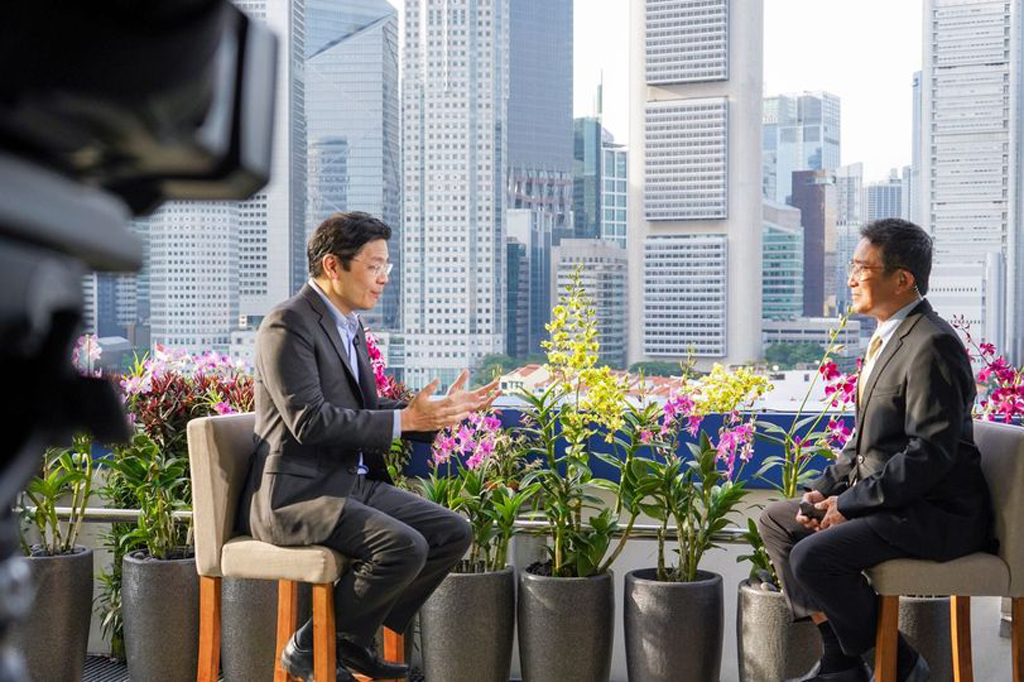S'pore has never relied solely on lower taxes to compete for investments: Lawrence Wong
Sign up now: Get ST's newsletters delivered to your inbox

Finance Minister Lawrence Wong (left) speaks to CNBC presenter Martin Soong during an interview with CNBC's Squawk Box Asia on Feb 21, 2022.
PHOTO: LAWRENCE WONG/FACEBOOK
Follow topic:
SINGAPORE - Although Singapore has never relied solely on lower taxes to compete for international investment, a global minimum corporate tax rate will have an impact, and it means that the Republic has to redouble its efforts to strengthen other competitive factors such as infrastructure and the capabilities of its workforce.
Finance Minister Lawrence Wong said this in an interview with CNBC's Squawk Box Asia on Monday (Feb 21) when quizzed about the slew of tax hikes announced in his Budget speech last Friday.
Mr Wong told Parliament that Singapore is exploring a top-up tax called the Minimum Effective Tax Rate for multinational corporations here to meet the 15 per cent minimum tax rate that is being sought under the Organisation for Economic Cooperation and Development's Base Erosion and Profit Shifting initiative, or BEPS 2.0.
On Monday, the minister told CNBC anchor Martin Soong that if the minimum global corporate tax rate does happen, it will move the world towards a level playing field and reduce the scope for tax competition.
"We are studying all that and we are determined to make sure that Singapore remains one of the best places in the world for business," he said.
Mr Wong added that it is also not sustainable for Singapore to compete on cost alone because wages have to go up as society and the economy progresses. "If we are keeping (costs) artificially low, it means we are keeping wages low as well."
He said: "As wages rise, then we have to compete on the basis of capabilities, productivity, innovation. And that is why the more sustainable solution going forward is to invest in capabilities for our businesses and our workers."
He cited the almost $9 billion that has been allocated over the next five years to co-fund wage increases for lower-wage workers under the new Progressive Wage Credit Scheme and enhance the Workfare Income Supplement scheme, which he said was "effectively a negative income tax".
"Rather than taxing low-wage workers, I top up their salaries," Mr Wong said.
"We are confident that we can ensure the incomes of low-wage workers continue to rise faster than median wages in Singapore over the coming decade."
On the other end of the wage scale, he said Singapore is not against people doing better or earning more and accumulating wealth - but those who have greater means should contribute a larger share as part of a renewed and strengthened social compact.
That is the basis of how the Government is thinking about some of the revenue changes it has put in place, which includes increasing taxes on the personal income of top earners and on high-end properties and cars.
"It is fair, it is progressive, and I think it will help to hold our society together, even as we enter a new era of a post-pandemic future which will be more uncertain, more volatile," said Mr Wong.
Asked if there were any discussions about introducing a capital gains tax or a tax on dividends, Mr Wong said these options continue to be studied.
He also reiterated previous arguments against a net wealth tax, including the difficulty of estimating the wealth of an individual and the ease at which wealth can be moved out of Singapore.
"We don't rule anything out in that sense. But I think we also have to be practical," he said. "We really want to have a balanced tax structure."
Striking a balance was also what had informed the decision to delay and stagger the impending goods and services tax (GST) hike, instead of raising it at one go this year.
This decision was made precisely because of concerns over GST rates going up at a time of rising prices, Mr Wong said.
He said Singapore has spent a lot of money in the past two years during the pandemic, so revenue needs are very pressing. On that fact alone, the Government could have raised the GST from 7 per cent to 9 per cent in one go this year.
But Mr Wong said he decided to find a balance after looking at the inflation outlook and the state of the economy. "We do look at the options very carefully," he added.
He said the Government wants to ensure that its finances get back on a sound and sustainable footing, but at the same time, it also has to moderate the pace at which it tapers some of the support given to sectors that are still struggling.
Looking ahead, Mr Wong said the economy is set to grow 3 per cent to 5 per cent, but that there are downside risks for both growth and inflation, including potential conflict in Ukraine, supply chain disruptions and possible pandemic-related risks.
The Monetary Authority of Singapore has been taking proactive steps to dampen inflationary pressures and it continues to monitor the Singapore dollar to ensure stable prices over the medium term, Mr Wong added.
Should the situation take a turn for the worse, Singapore stands ready to respond, he said. "We will not hesitate to use the full measure of our fiscal firepower to keep the economy going, to preserve jobs for locals, and to minimise any long-term economic scarring."

